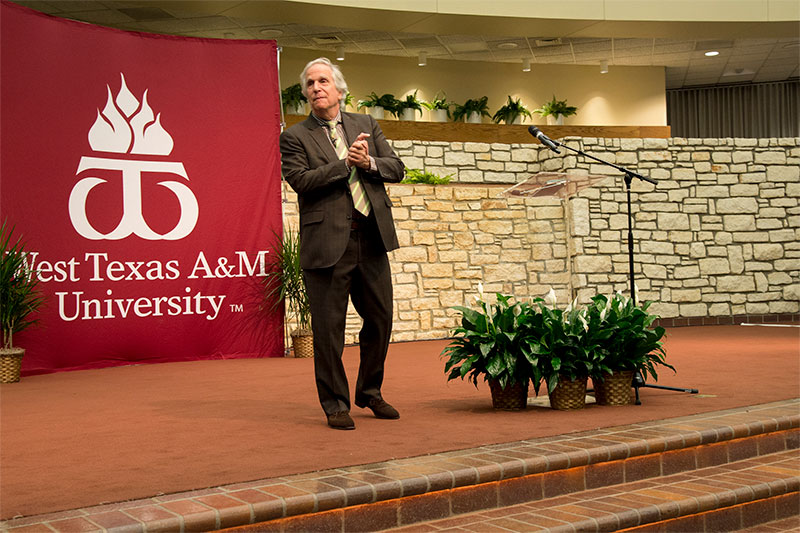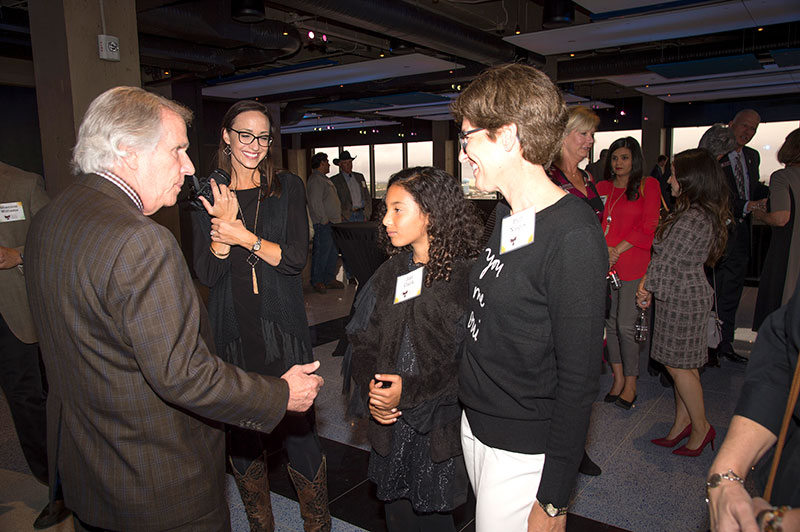- Jon Mark Beilue
- Community
Breaking the Dyslexia Barrier
West Texas A&M University's Learning DisABILITIES Center Answering a Hidden Need
John and Sharon Pace had gone through many of the same things with their son years ago. Now that they had adopted Jasmine, their son’s daughter and their granddaughter, genetics was repeating itself.
“I was greatly frustrated that I didn’t understand what was going on, what our options were out there,” Sharon said. “We just didn’t have a whole lot of answers.”
That was in 2010. Jasmine was then 10 years old. Day care and pre-kindergarten teachers could tell she was behind in learning with her peers when she was 4 and 5 years old. The Paces had Jasmine tested.
The results? ADHD and dyslexia.
Their son had the same learning disabilities. At the time, John was in the military and the family moved frequently. They weren’t at one place long enough for any program to work, and Sharon believed schools weren’t interested in helping if they were soon leaving.
But, now that they were retired in their Pleasant Valley home just north of Amarillo, and this was their adopted daughter, it was much different. But the same questions and concerns nagged them.
“So we took the bull by the horns and went to the school’s diagnostician and said that we need help,” Sharon said. “We do not want to go for another 12 to 13 years and struggle with this.”
Kim Cole, a resource teacher at Pleasant Valley Elementary School, had a suggestion. Why don’t you come with her to something new, this West Texas A&M Center for Learning DisABILITIES? With nothing to lose, they did.
“We started getting answers. We started understanding,” Sharon said. “It has made our lives and Jasmine’s life so much better. We owe so much to that first meeting we went to.”
Many questions, no answers
Now, in 2018, the WT Center for Learning DisABILITIES is in its eighth year. Housed at the FirstBank Southwest Tower, formerly the Chase Tower, in downtown Amarillo, the learning disability center will move a few blocks south to 800 S. Tyler Street when WT’s new Amarillo Center opens in a few months.
On Oct. 9, the learning center had a fundraising dinner at the Civic Center’s Grand Plaza. Guest speaker was actor Henry Winkler, who rocketed to fame as “Fonzie” in the hit 1970s sit-com “Happy Days.” Winkler, 72, had severe dyslexia as a young boy in New York before such a disorder was diagnosed.
In addition to his acting, directing and producing, Winkler has written a series of books of a young boy who overcomes his trouble with reading.
Puff Niegos can relate. Matthew, her son, was diagnosed with dyslexia in the fifth grade. At the time, there was not much that could be done.
“It was like, ‘Where do you go to get information? What do you do about this?’” Niegos said. “I had all these questions and nowhere to get answers. From the school, they said there is nothing you can do. I didn’t like that.”
Matthew wasn’t failing, so he was not eligible for program help at the time in the Amarillo ISD. But he persevered through extra time with teachers, through private tutoring and extra work at home.
He graduated from Amarillo High in 2010, Rhodes College in Memphis, Tenn., and graduated cum laude from SMU Law School. He’s currently waiting on the results from his bar exam.
“I had some resources, and I could make this work,” Niegos said, “but what about kids in a single-parent family who don’t have the resources to get private tutoring. What happens to those kids?”
Niegos didn’t know where exactly to go and what to do. But she was convinced research and evidence-based curriculum were the avenues to pursue.
“What better place to do that than a university?” Niegos said.
She found a sympathetic ear in Dr. Eddie Henderson, Dean of the College of Education and Social Sciences at WT. More than 70 percent of educators in the Texas Panhandle have at least one degree from WT.
Special education faculty at WT soon bought in. What was established in 2010 was the Center of Learning DisABILITIES, which focused on education and resources for parents, workshop support and promoting success for students, and assist teachers and WT education students in strategies for dyslexic, ADHD and ADD students in the classroom.
‘We’re moving the needle’
“We exist because we want to help students reach their potential,” Niegos said.
There are monthly community workshops where educators, administrators, pre-service teachers, parents and students convene. There’s an open forum discussion followed by a presentation.
Students, in another area, are instructed in self-advocacy and other strategies. There are students from second-grade age into college. When the learning disability moves into the WT Amarillo Center, there will be room for therapists. The Geneva Schaeffer Resource Room will also provide a myriad of technology to assist parents.
There are referral services if, for example, a parent wants their child tested outside the school system. Parents are navigated through what Niegos calls a “spider web” of educational acronyms and programs.
“Last month, we had 70-plus participate in a parents' night,” she said. “When you have that many, you know there’s a need.”
Approximately 1,800 were served through conferences, workshops, “mindplay,” and therapist meetings in the 2017-2018 school year.
There are yearly conferences, where experts are brought in from universities like Tufts in Boston and SMU. This year, Dr. Tim Odegard from Middle Tennessee State, one of the nation’s authorities on dyslexia, spoke on the building blocks of reading.
“In the Texas Panhandle, we don’t have easy access to a lot of these experts, so if we can bring them in, a school system can send more than one to a conference this close,” Niegos said. “A lot of times, you send one teacher to a conference a long way off, you lose something in the transition.”
October is National Dyslexia Awareness Month. The learning center also focuses on students with ADD, ADHD, dysgraphia, a writing disorder, and dyscalculia, a math learning disability.
“We’re talking a lot more about learning disorders as a nation and community,” Niegos said, “and we’re providing a place for parents to go. We’re not where we want to be, but we’re moving the needle.”
For John and Sharon Pace, their daughter, Jasmine, is now a senior at Palo Duro High School. She carries a 91.2 grade average and plans to attend Amarillo College and then WT. It’s been a collaboration to get her this far, but the Paces credit the learning center for much of it.
At their first meeting eight years ago, a therapist took Jasmine, then 10, and other children aside to teach them techniques on how to stay calm when they get anxious or frustrated.
“We have learned a tremendous amount from attending the meetings,” Sharon said. “And about 4th or 5th grade, Jasmine started asking the question – ‘Is this because of my disability and am I doing this because of that?'
“This has exceeded our expectations. Really, it’s been fantastic.”
Do you know of a student, faculty member, project, an alumnus or any other story idea for “WT: The Heart and Soul of the Texas Panhandle?” If so, email Jon Mark Beilue at jbeilue@wtamu.edu.

